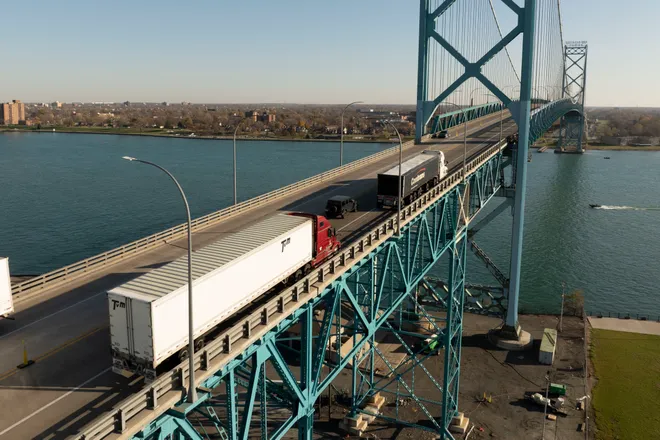Washington — The commercial trucking industry that transports goods across Michigan’s border with Canada underwent significant change in 2024, according to federal data released Tuesday.
After recovering somewhat from a pandemic-era slump in 2023, commercial traffic on the Ambassador Bridge connecting Detroit to Windsor fell close to historic lows last year. By contrast, some 90 minutes northeast, truck traffic over the Blue Water Bridge connecting Port Huron to Sarnia hit a record high.
“The Blue Water Bridge has done some pretty significant construction to make it more efficient,” said Tal Czudner, president of the Bridge and Tunnel Operators Association. More importantly, he said, the Blue Water is “significantly cheaper.”
The shift could reflect fatigue among international traders and shippers fed up with high prices on the privately-owned Ambassador Bridge in the last full year before the Gordie Howe International Bridge opens. The new passage is set to begin service in September 2025. When it does, it will likely cut Ambassador traffic further while ending the 95-year-old bridge’s monopoly on international trucking in and out of Detroit.
Truck traffic
The Ambassador Bridge saw close to historic lows in trucking traffic in 2024, according to two different datasets. Its traffic advantage over the Blue Water Bridge also reached its smallest level on record.
Federal data on incoming trucks from Canada, available dating to 1996, show that Ambassador Bridge traffic in 2024 was the third-lowest on record. The only years with lower traffic levels were 2009 during the global financial crisis and 2020 amid the coronavirus pandemic.
Separate data from the Bridge and Tunnel Operators Association, which tracks traffic in both directions across the U.S.-Canada border, show that Ambassador Bridge trucking reached the lowest level on record. Data is available dating back to 2006.
About 2.3 million trucks passed over the Ambassador Bridge in 2024, a decline of roughly 286,000, or 11.1%, from the previous year, according to the association’s data. About 1.9 million trucks used the Blue Water Bridge last year, an increase of more than 237,000, or 14.6%.
The Blue Water Bridge opened in 1938 and added a second span, including three more lanes, in 1997. The old span handles incoming traffic to the United States, and the new one handles outbound traffic to Canada. Bridge operations are managed jointly by the Michigan Department of Transportation and the Federal Bridge Corporation of Canada.
“Both MDOT and FBCL strive for a positive experience for our commercial and passenger users,” said Jocelyn Garza, a spokesperson for MDOT.
She noted different toll rates at the two bridges but said the government “can’t speak for the industry” on why more trucks went through Port Huron and any long-term implications for Michigan trucking.
Michigan-Ontario border crossings
The Detroit International Bridge Co., a private company previously owned by the late businessman Matty Moroun, manages the Ambassador Bridge. His son Matthew now runs the company.
Michael Belzer, a Wayne State University economist specializing in the trucking industry, also suggested that costs were probably a big factor in recent traffic flows. “The Ambassador has had high toll rates because they can — because they have had a monopoly,” he said. “And they have a great location that’s provided them with even more advantages.”
The Detroit International Bridge Co. and the Michigan Trucking Association did not immediately respond to requests for comment.
Toll prices are considerably cheaper across the Blue Water Bridge than the Ambassador. The price per truck axle on the Blue Water is $4.25, according to MDOT. The price went up by $1 in December 2024, the first rate hike since 2010. Prices are set to increase again in December 2025.
On the Ambassador Bridge, the per-axle toll is $14 when using an A-Pass or E-ZPass transponder. That rate took effect in January 2025 and represents an increase of up to $3 per axle over the previous fee structure.
Commercial trucks, also known as semis or 18-wheelers, usually have five axles when hauling a trailer. The typical per-truck cost to cross the Blue Water Bridge is $21.25, whereas the Ambassador Bridge costs $70.
Toll rates for the Gordie Howe Bridge have not been announced. Belzer said he expects a “not insignificant fraction” of current traffic over the Blue Water Bridge will shift to the Gordie Howe once it opens “unless the price is too high.”


